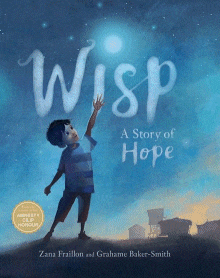
Wisp
Wisp
Zana Fraillon
Grahame Baker-Smith
Hachette, 2018
32pp., hbk., RRP $A24.99
9780734418043
Idris lived in a small world where fences grew from the ground, shadows ruled and there were no trees offering shade, no rivers offered cool water to drink and there were no seas to swim in. His was a world full of people, but everyone in it was alone.
Then one evening a Wisp came in on the evening breeze, unnoticed by all except Idris who gentlied it from the ground and softlied away the dust. Clean and free, it began to wriggle and flitted away, finally settling at the feet of an old man, whose eyes had blurred long ago, but who put the Wisp to his ear and music memories of long ago poured forth. Then, when it came again, it went to a woman who whispered the magic word, “Once” and a forest blossomed and a thunder of colours rained down. Whispers start as the memories are released and shared and gradually the loneliness is not so sharp any more.
Time and again the Wisp brings memories to those who have not forgotten but who have no one to share them with, so what happens when the Wisp settles with Idris, whose only memories are those of the desolate, lonely place he lives in?
Set against the darkest palette that reflects the world of Idris but which lightens when memories are evoked, this is a story of hope and promise – something that no amount of hardship and desolation seems to dampen within the human spirit. No matter where the refugee camp is there is always hope that there will be freedom and a life without fences, restrictions and oppression. With its poetic, eloquent words, this is another picture book that brings to life and light the plight of refugees around the world, adding to a growing collection that makes the more fortunate stop and think.
For most children in our care, the world of refugees is not part of their every day experience but as some people show compassion and open their hearts and their doors to the families, it is creeping ever closer as the children become part of our classes, and everyone’s life is enriched. Other reviewers have suggested that this book is for those 5 or 6 years and up but as I watch colleagues share stories like The Wonky Donkey and The Book with No Pictures I wonder if those of such a young age are ready for one such as this. What questions will it raise and will we be able to answer them adequately, let alone reassure them? Certainly, if the concept of refugees is part of their known world, then in the hands of someone prepared to listen and explain, younger readers will manage it, but IMO it is one for older readers who have an understanding of the sorts of things that cause people to flee their countries; the fears of those who think such people need to be imprisoned rather than welcomed; and the concepts of hope and freedom. Despite its warm fuzzy ending, like A Different Boy, the underlying constructs are dark and it is one that needs to be read before it is shared, particularly if there are children who have been in camps like Idris in the audience. Sensitivity is essential.